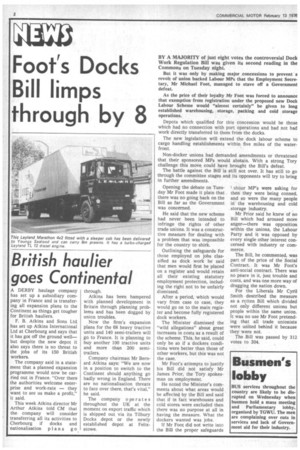Foot's Docks Bill limps through by 8
Page 4

If you've noticed an error in this article please click here to report it so we can fix it.
BY A MAJORITY of just eight votes the controversial Dock Work Regulation Bill was given its second reading in the Commons on Tuesday night.
But it was only by making major concessions to prevent a revolt of union backed Labour MPs that the Employment Secretary, Mr Michael Foot, managed to stave off a Government defeat.
As the price of their loyalty Mr Foot was forced to announce that exemption from registration under the proposed new Dock Labour Scheme would "almost certainly" be given to long established warehousing, storage, packing and cold storage operations.
Depots which qualified for this concession would be those which had no connection with port operations and had not had work directly transferred to them from the docks.
The new legislation will extend the dock labour scheme to cargo handling establishments within five miles of the waterfront.
Non-docker unions had demanded amendments or threatened that their sponsored MPs would abstain. With a strong Tory challenge this move, could have brought the Bill's defeat.
The battle against the Bill is still not over. It has still to go through the committee stages and its opponents will try to bring in further amendments.
Opening the debate on Tuesday Mr Foot made it plain that.. there was no going back on the Bill as far as the Government was concerned.
He said that the new scheme had never been intended to infringe the rights of other trade unions. It was a constructive measure for dealing with a problem that was impossible for the country to shirk.
Outlining the safeguards for those employed on jobs clas sified as dock work he said that men would first be placed on a register and would retain all their existing statutory employment protection, including the right not to be unfairly dismissed.
After a period, which would vary from case to case, they would go on to the main register and become fully registered dock workers.
The Minister dismissed the "wild allegations" about great increases in costs as a result of the scheme. This. he said, could only be so if a dockers condi tions were better than those of other workers, but this was not the case.
Mr Foot's attempts to justify his Bill did not satisfy Mr James Prior, the Tory spokesman on employment.
He noted the Minister's comments about what areas would be affected by the Bill and said that if in fact warehouses and cold stores were excluded then there was no purpose at all in having the measure. What the dockers wanted was jobs.
If Mr Foot did not write into the Bill the proper safeguards abour MP's were asking for then they were being canned, and so were the many people in the warehousing and cold storage industry.
Mr Prior said he knew of no Bill which had aroused more anger—there was opposition within the unions, the Labour Party and it was opposed by every single other interest concerned with industry or commerce.
The Bill, he commented, was part of the price of the Social Contract. It was Mr Foot's anti-social contract. There was no peace in it, just trouble and costs, and was one more way of dragging the nation down.
For the Liberals Mr Cyril Smith described the measure as a rotten Bill which divided not only different unions but people within the same union. It was no use Mr Foot pretending that all trade unionists were united behind it because they were not.
The Bill was passed by 312 votes to 304.




























































































